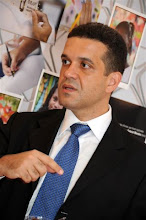- Back to Home »
- Innovation at Unicamp
 Unicamp - State University of Campinas (SP), between 2001 and 2003, established 527 accords and projects of partnership with public and private companies, that generated a prescription of about R$ 85,5 million. One of the prominences was the performance of the University in the Genoma Program. In this direction, it organized and co-ordinated the sequence of Xyllela fastidiosa bacteria causing the "plague of amarelinho", illness that affects 30% of the São Paulo orange groves. As consequence, researchers of the Unicamp had been pioneering in the formation of new companies of bioinformatics and applied genômica, between them the Scyla Bioinformática (http://www.scylla.com.br/) and the Alellyx Applied Genomics (http://www.alellyx.com.br/). Moreover, it possess 24 registered patents, being 22 national and two international ones. Instituted in middle of the 60´s, Unicamp was developed as a research university and today presents a profile of qualification of high level, in accordance with the national and international standards of qualification and university evaluation.
Unicamp - State University of Campinas (SP), between 2001 and 2003, established 527 accords and projects of partnership with public and private companies, that generated a prescription of about R$ 85,5 million. One of the prominences was the performance of the University in the Genoma Program. In this direction, it organized and co-ordinated the sequence of Xyllela fastidiosa bacteria causing the "plague of amarelinho", illness that affects 30% of the São Paulo orange groves. As consequence, researchers of the Unicamp had been pioneering in the formation of new companies of bioinformatics and applied genômica, between them the Scyla Bioinformática (http://www.scylla.com.br/) and the Alellyx Applied Genomics (http://www.alellyx.com.br/). Moreover, it possess 24 registered patents, being 22 national and two international ones. Instituted in middle of the 60´s, Unicamp was developed as a research university and today presents a profile of qualification of high level, in accordance with the national and international standards of qualification and university evaluation.
Brazil has a relatively long history of science and technology, and the current leftist government of President Luiz Inácio Lula da Silva continues to prioritize scientific and technological development in the country. Successes in the agricultural, energy and engineering (e.g., aeronautics) sectors reflect its scientific strength. Brazil's terrestrial biodiversity, with numerous diverse biomes including the Cerrado, Amazon rainforest, Pantanal wetlands, Caatinga region, and Araucaria and Atlantic forests, is also unrivaled in the South American continent and probably elsewhere. This combination of natural and scientific resources gives the country great potential to promote biotechnology.












